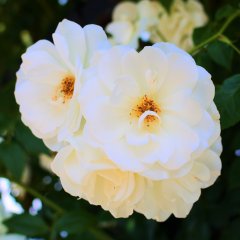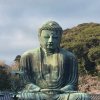On the site of Katori Jingu, one of the three great shrines of the east is another sacred spot called Okunomiya in Japanese. It's a five-minute walk south-east from Katori Jingu Shrine. It's worth the walk because it is known as a power spot that confers victory from a deity that guards a sacred sword.
This subsidiary shrine is dedicated to Futsunushi no omikami, the embodiment of the sacred sword Futsu no mitama used by Emperor Jimmu, and the grounds are filled with an otherworldly aura. Visitors usually go to Katori Jingu Shrine for worship but there are few visitors at nearby Okunomiya, though it's a powerful spot. Compared to the Katori Jingu Shrine, it is smaller and tranquil, surrounded by a hushed forest.
Upon entering the gate, you will find there is a long path leading toward the shrine. Wash your hands at the temizuya basin before your approach. and make a wish silently at the shrine. This shrine is special, as it was built with ancient timber, and is sourced from the same wood used in the construction of Ise Jingu Shrine Sengu in 1973.
Nearby there is an office where you can receive the goshuin stamp of Okunomiya.
The grounds of Katori Jingu Shrine sprawl and you will find some special objects. Here, you will find a special stone, called the Kaname stone, keystone, and its deep penetration into the earth is supposed to suppress earthquakes. Around the area, there are several subordinate shrines. The Shinto-curious may find these other small shrines interesting, too.
Katori Jingu and Okunomiya are great destinations any time of year, but it attracts the most visitors within the first few days of the new year. In this festive season, visitors can enjoy many food stalls on the road toward the main building. Note that at this busy time, there are long queues and it takes several hours to get the worship hall. For leisurely visitors, I recommend going there two or three weeks afterward this busy time.
More info
Find out more about Katori Shrine.





































